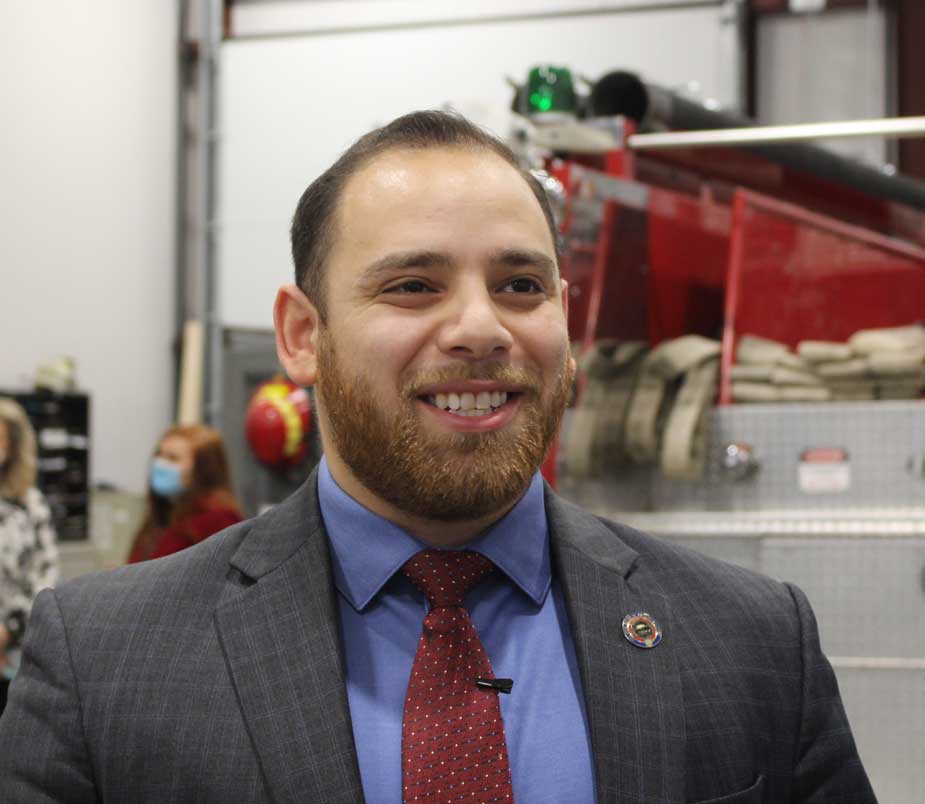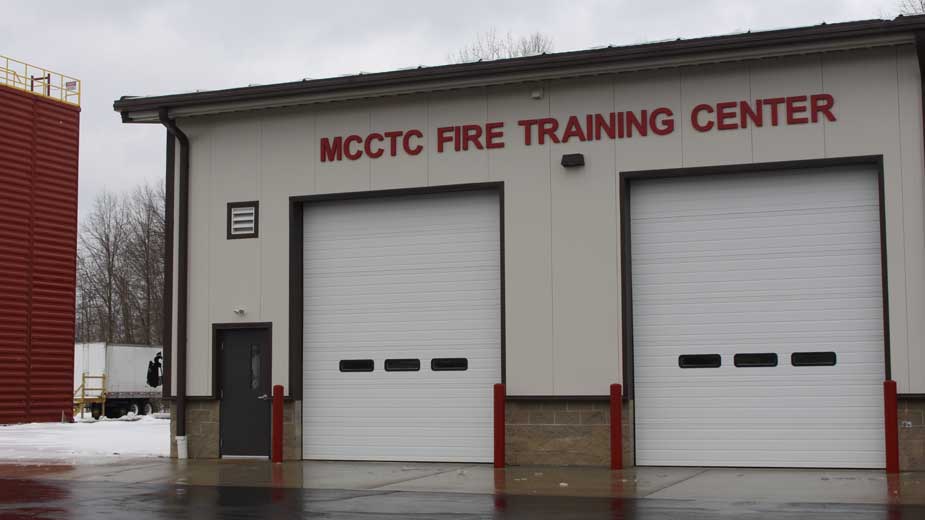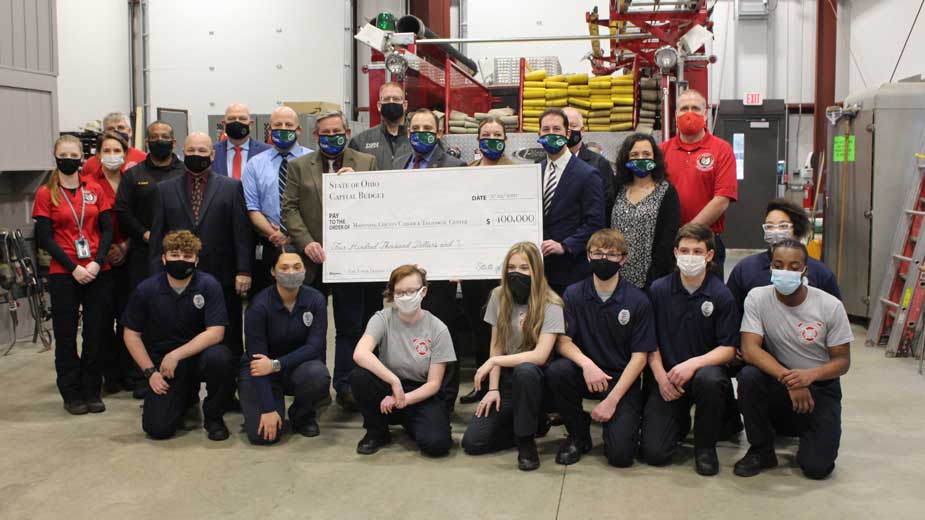CANFIELD, Ohio — Mahoning County Career and Technical Center public safety instructor Anthony Davis says consistency is everything in public safety, but first responders are used to making the best out of any situation.
Some of his MCCTC students were carrying desks Monday, placing them in rows behind a red fire engine inside the school’s fire training facility. It’s a makeshift classroom for aspiring firefighters, learning the trade so they can eventually join fire departments in Mahoning, Columbiana or Trumbull Counties.
In an effort to meet the career and tech school’s need for a permanent classroom for its Public Safety – Fire and EMT program, state Rep. Al Cutrona, R-59 Canfield, presented MCCTC a check for $400,000 from the state of Ohio’s capital budget plan for 2020-21.
“I found this essential for getting people out there in the job workforce,” Cutrona said Monday.
Having a permanent classroom will provide the consistency the students need to learn and serve the public, said Davis. “We’re very thankful for it.”

At its board meeting Monday, evening, the MCCTC governing board approved a contract with Adolph Johnson & Son Co. to construct the new classroom. MCCTC Superintendent John Zehentbauer said the school looks to break ground on the project this week or next. He expects it will take 12 to 20 weeks before the steel comes in for the building, and the project should be complete by mid-fall, he said.
The project is estimated to cost $610,000, added Michael Stanko, board president. When complete, the classroom will be used by students from both the high school and adult education public safety programs.
“We have budgeted an additional $250,000 at this point and time out of our general budget to complete the project,” Stanko said. “We’re still trying to apply for grants and whatever type of funding that we can to help alleviate that debt.”
This addition is the final phase of this project — bringing the cost of the 12,000-square-foot building behind MCCTC to about $1.7 million when the classroom is complete with the renovations, equipment, supplies and materials, Zehentbauer said. The $1,000,000 firehouse and outdoor training center opened almost a year ago.
Representatives from the 13 fire districts in Mahoning County served on the advisory committee for the project, providing input needed to ensure the right amenities for training new firefighters and reorientation of current civil servants. MCCTC can provide most of the training at its Canfield location and partnered with the state fire marshal’s office, Zehentbauer said.
The new classroom will be attached to the north wall of the firehouse, looking at the fire tower. The one-story classroom will have a sloped roof and a porch facing the fire tower so trainees can watch during snowy or adverse weather conditions.
Cardinal Joint Fire District Chief Don Hutchison said his department and many others in Trumbull, Mahoning and Columbiana counties have a great relationship with MCCTC, its fire training program and instructors, all of whom are full-time firefighters from Mahoning County.
Going through MCCTC saves the fire departments from having to send their firefighters to Columbus, Canton or Cleveland for training, he said. It also saves the departments on the added expenses of hotel rooms, meals and other incidentals.

The United States Environmental Protection Agency limits the use of abandoned buildings for fire training, but the MCCTC facility provides a controlled area to enhance their skills. Such training is essential for incoming trainees as well as refresher courses to work with up-to-date search and rescue techniques and thermal imaging cameras, Hutchison said.
“You can’t do enough of that,” he said. “That’s what we’re able to do here, have live fires and also hands-on training.”
MCCTC also helps when local fire departments are evaluated by the Insurance Services Office, which scores departments on how well-protected a community is by its fire department, he noted. A score of one is the best possible rating, while a 10 means the fire department did not meet the ISO’s minimum requirements.
“This fire training tower and institution will help us decrease our fire rating,” Hutchison said.
The cost to a fire department to use the training center is about $1,200 for the Firefighter 1 class and $1,500 for Firefighter 2 and emergency medical training courses. Firefighter 1 teaches the basic fire service qualifications, while Firefighter 2 focuses on how to assume and transfer command at a fire scene using the department’s incident management system. There is ongoing certification for firefighters.
MCCTC is “continually seeking funds to actually provide as much help and free training as we can get,” Zehentbauer said.
“Each fire department has a budget and they’re supporting us through that budget,” he said. “They know it’s much cheaper and much more effective to use their instructors and provide that along with the fact they don’t have to drive to Columbus.”
Those firefighters taking advantage of continuous education are not the only ones being served at the school. MCCTC’s Davis said high school juniors and seniors are given that experience through their classes at the Canfield campus to learn from the live action outside, applying what they’ve learned inside the firehouse classroom.
Davis wants to develop young men and women who will be a great addition to society and have the types of skills needed in emergency situations, he said. Students go through a state-certified fire academy at MCCTC, learning everything from CPR (Cardiopulmonary resuscitation), fighting fires and rescuing so when they graduate they have the opportunity to obtain their Firefighter 1 or 2 and EMT certification, he said.
The new classroom provides the appropriate tools, he added.
“That is imperative to any type of academy,” Davis said. “It needs to feel like fire, smell like a fire class. So that when they go to their respective departments, it’s not a shock. They’ve already been there.”
Pictured at top: State Rep. Al Cutrona, R-Canfield, presents a $400,000 check to MCCTC on Monday to add a classroom to the fire training facility there. On hand were MCCTC staff, faculty and students from the Public Safety program.
